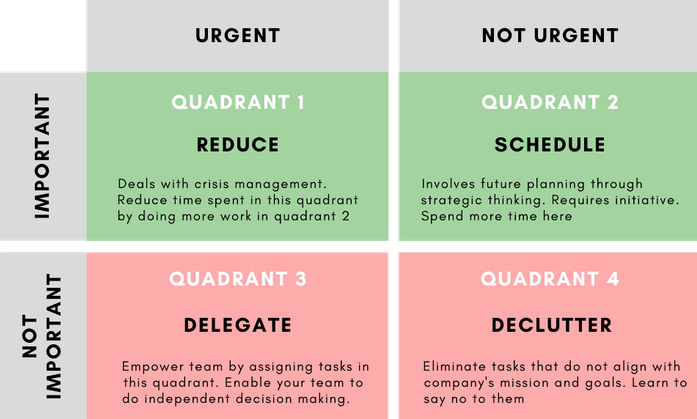Welcome to Dear Puttylike, where our team of writers tackles your burning multipotentialite questions! Submissions are edited for length and clarity.

Dear Puttylike,
I’m finding it really hard to prioritize all my (multipotentialite) eggs, along with an online Master’s course. All the known time and focus management techniques just seem to add to the clutter in my brain. I don’t want to reduce the projects I’m working on, but deep work seems like an impossible task as well.
Thanks!
An Indian Student Who Cannot Sit Still

Dear Cannot Sit Still,
Mel here! As a fidgety multipotentialite with plenty of passions, I feel your pain! I have three pieces of advice for you.
1. Decide on a method of prioritization that feels authentic to you
It’s typical to prioritize by sorting out which tasks are urgent, which are important, and which are both. I encourage you to add other criteria, like what is more interesting at the moment, what requires the most energy from you, and what you predict will give you the most satisfaction from getting it done. You will need to decide which prioritization criteria works in your favour, and which past work rules no longer serve you.
What do I mean by work rules? You say that “deep work seems like an impossible task.” This tells me that one of your work rules might be something like To really work, I need at least 3 hours of uninterrupted time. This is impossible in the life of a multipotentialite grad student like you! Some other common (yet unhelpful) rules we tell ourselves are I’ll be more focused later, and I actually work better under pressure!
These work rules may be true for you, But they are also not serving you right now. Part of what’s cluttering your brain is the disappointment of not devoting “enough” time to any of your projects. Unfortunately, time is a finite resource—even for multipotentialites. Let’s see how you can use two additional strategies to get more joy out of the time you do have.
2. Gain insight into what makes you react
Have you ever used the Eisenhower Matrix? It’s a way of visually mapping out the importance and urgency of different tasks. In my opinion, the Eisenhower Matrix is most useful to people who feel like they are constantly putting out fires—reacting to external expectations instead of finding time for work that fulfills their internal expectations. If you feel that being in crisis mode is stealing most of your time, this matrix can help you quantify where the time is going.

Start by sorting your daily tasks into each of the four quadrants: (1) important and urgent; (2) important but not urgent; (3) not important, but urgent; (4) not important and not urgent. Sorting tasks in this way can give you insights about how your work habits might have slipped into less productive or satisfying patterns as you added more multipotentialite eggs to your basket.
For example, you might find that you switch your attention too often to respond to a short, “urgent” task that gives you a hit of dopamine (feels great!) but results in too much time spent getting focused again on the (more effortful, less satisfying in the short term) task at hand. If you have trouble sitting still to focus on one of your interests, you might paradoxically get more work done by reducing the time you spend on each task, rather than chaining yourself to a painful drawn-out period of “deep work” with no breaks.
How did it feel to use the Eisenhower Matrix? You might be surprised at:
- How many things end up in Quadrant 4. You designate them as neither important or urgent, yet you inexplicably make time for them every day! (Hint: you’re probably doing it for the dopamine);
- The difficulty of delegating tasks in Quadrant 3. Common advice says that if someone else can do a task 70% as well as you could, you should let that person take care of it. But it’s hard!
- How nebulous Quadrant 2 can be. Who decides what is important when there’s no external pressure (urgency) bearing down on you to do it?
This takes us to our next strategy: Know where the pressure is coming from.
3. Identify your Tendencies
In her book, The Four Tendencies, Gretchen Rubin breaks categorizes people based on how they see the world and take action. Knowing your Tendencies can give you more insight into the way you respond to internal and external expectations. As Rubin puts it:
- Upholders want to know what should be done.
- Questioners want justifications.
- Obligers need accountability.
- Rebels want freedom to do something their own way.
She even offers a quiz to discover your Tendencies! Here’s some advice for each of the four categories:
Rebels probably don’t read advice columns
If you are a Rebel, I’m sorry, I can’t help you. No advice column can! That’s because Rebels resist putting expectations on themselves. Gretchen Rubin’s advice for working with Rebels involves using reverse psychology which is just confusing for everyone else reading this column. So…don’t check out her video about how Rebels can help themselves achieve their goals?
Questioners can use radical acceptance to get through illogical but necessary tasks
If you are a Questioner, you might be having trouble prioritizing because too many of the tasks you feel responsible to complete (including that online Master’s course) are coming from other people, instead of from your own authentic multipotentialite interests. You may be unwittingly adding to the clutter in your brain by trying to convert other people’s expectations into ones that you also want for yourself. A Questioner will only get going on a task when they endorse it for themselves, usually through getting a lot of data-driven answers to their objections about the task first.
Sound familiar? You can try the “hoop-jumping” approach I used to finish my PhD. My motto was Done is better than perfect. I stopped questioning the requirements to get my degree, and just got them done so I could move on. I scheduled time to “jump through the hoops”, as well as one day per week for what I called “professional development” (i.e., time to explore my multipotentialite interests and passions). Rigidly enforcing these time designations made my life feel more balanced and under control.
Obligers need to trick themselves into putting their interests first
If you are an Obliger, go back to that Eisenhower Matrix and read all the things you wrote down in Quadrant 2. Why aren’t you getting any of those done? Is it because spending time on them isn’t important to anyone but you? The hallmark of an Obliger is regularly sacrificing your own interests and goals so that everyone else gets what they want first. Your multipotentialite dreams don’t get to see the light of day because they are continuously overshadowed by others’ needs.
So here’s a paradoxical piece of advice: Use other people’s expectations to achieve your own goals. Get someone or something else to keep you accountable. For example, if you’ve downloaded an app to help you learn a new language, turn on those impertinent app notifications to remind you to use it 5 minutes every day. Ask someone who speaks that language to call or text you once per month to greet you in that language. Make time for your personal passion by making it feel like you’re doing it for someone else!
Upholders may need to let go of a multipotentialite dream that’s gone stale
If you are an Upholder, you usually don’t have a problem meeting your own and others’ expectations. So, if you are having trouble right now, it’s likely temporary. It could be that you are experiencing burnout, or that there is a multipotentialite task in your life that used to bring you a lot of satisfaction, but is now just draining your energy. If that’s true for you, read this excellent blog post from Dr. Marla Gottschalk about how letting go of an outdated goal might just be the brain decluttering you long for.
So, here’s what you can do when you’re having trouble prioritizing your multipotentialite life
- Add your values to the way you prioritize. Maybe a multipotentialite interest is neither important nor urgent to anyone else but you. If it brings you deep joy and satisfaction, advocate for it to stay in your life. Block off time (even if it’s short) for that interest, and don’t allow others to steal it away from you. That precious time will energize you for the rest of the things you have to do. It may even give you the courage and ideas necessary to make even more time for multipotentialite joy in the future.
- Revisit the Eisenhower Matrix for insight into your patterns. What needs to shift so that the Important and Urgent don’t rule the rest of your life?
- Respond to your Tendency. How can you use the way you respond to expectations to reduce the clutter in your brain?
If none of this works for you, you might genuinely have too many multipotentialite eggs in your basket. I’ve been there! Read this article from Neil Hughes about experiencing more contentment through less productivity. In the end, it might be the infuriating yet satisfying advice we all need!
Much love,
Mel
Your turn
How do you prioritize your projects and get stuff done? Got any advice to share with Cannot Sit Still? Share your thoughts in the comments below.

Is there something that’s getting in the way of you living your best multipotentialite life? Got a puzzling productivity challenge or career quandary? Is there a particular family member who won’t accept your many facets? Or maybe you have a more general question about multipotentialites and how we move through the world? Send your “Dear Puttylike” questions to advice@puttylike.com

Doing/being/exploring ALL THE THINGS is easier with a community!

Did you know we have a private community of hundreds of multipotentialites from around the world? We support each other, share advice and cheer each other on as we building lives and career around ALL our passions.
We only open the doors once a month for 2 days, and lucky for you, that time is now!:


Thanks for this, Mel, it’s really helpful. I’m definitely mostly a Rebel, though I can also see aspects of my behavior in the other types as well. I’m definitely going to try some of these tips to keep myself motivated and on track.
You’re welcome, Karen! It definitely made my day to hear that a Rebel found this helpful too.
Thanks for the tips Mel! Especially your motto, “Done is better than perfect”. It resonates with the permission giving that I try to give myself when I access self-compassion. Thanks for the kind reminder that the effort to get it done, is in itself, already good enough. Really helps to read this as I finish some major projects at school!